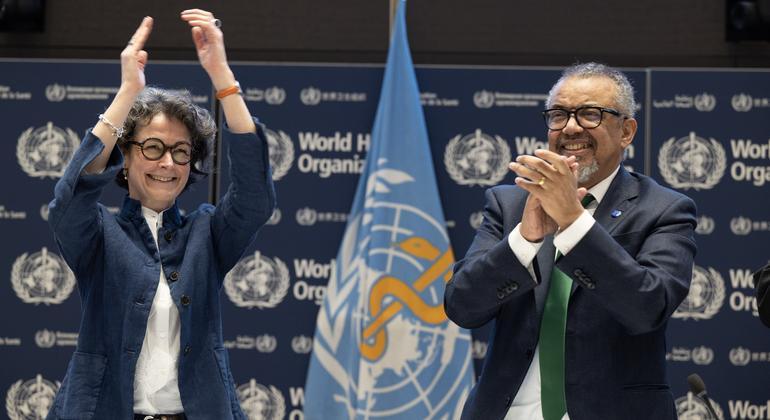Developed after more than three years of negotiations under the auspices of the World Health Organization (WHO), the project describes a framework to strengthen international collaboration, equity and resilience in the face of future health threats.
“”Nations of the world have made history in Geneva today“Said the director general of the OMS Tedros Adhanom Ghebreyesus.
“By reaching a consensus on the pandemic agreement, not only did they set up a generational agreement to make the world safer. They have also shown that multilateralism is alive and that in our divided world – nations can always work together to find common ground and a shared response to shared threats.“”
Approach ‘One Health’
Negotiations began in December 2021 at the height of the Pandemic COVID-19, when the member states of the WHO agreed with the urgent need of a legally binding international instrument and established the intergovernmental negotiation body (INB).
The process involved 13 series of official negotiations, many of which were extended in the early hours, culminating in the consensus on Wednesday after a last night session.
The key elements of the proposed agreement include a commitment to a “health” approach to pandemic prevention, stronger national health systems, the creation of a financial coordination mechanism and the creation of a network of supply chain and logistics coordinated on a global scale for health emergencies.
The project also offers a new system of access to pathogens and benefits of benefits, an increased support for the transfer of technology and knowledge as well as capacity building, and describes a specialized and multidisciplinary national emergency workforce.
National sovereignty confirmed
The text also affirms the national sovereignty of public health decisions. It explicitly indicates that nothing in the agreement gives who the power to impose health measures such as locking, vaccination campaigns or border closures.
The project will now be subject to the 78th World Health Assembly examination – the highest United Nations Forum for World Health – which is expected to start on May 19. If it is adopted, it will be subject to a ratification by individual nations.
According to the media, the United States has not participated in the last series of negotiations, following its January announcement to withdraw from the World Health Organization, and would not be bound by the Pact.
A vision of the closing session of the intergovernmental negotiation body (INB).
A breakthrough for health equity
Speaking at the end of the meeting, the director general of WHO Tedros congratulated the negotiation teams and the management of the INB for their perseverance and their shared objective.
“”This achievement is not only a diplomatic success“, He said.” This reflects your resilience, your unrevable unit and your commitment to the health and well-being of people everywhere. »»
The co -president Inb Precious Matsoso from South Africa qualified the result of breakthroughs for equity in health.
“The negotiations, sometimes, were difficult and prolonged. But This monumental effort was maintained by the shared understanding that viruses do not respect borders – that no one is immune to pandemics until everyone is safe“She said.
The co-owner Anne-Claire Amprou de France added that the agreement laid the foundations for a stronger and more equitable global security architecture.
“This is a historical agreement for health security, equity and international solidarity,” she said.
Learn from Covid-19, looking towards the future
The agreement emerged in the aftermath of the COVVI-19 pandemic, which exposed critical vulnerabilities in global health systems and striking inequalities in access to diagnostics, treatments and vaccines. The virus has cost nearly seven million lives around the world, has seriously disrupted economies and overwhelmed health services around the world.
At the same time, the pandemic sparked the largest vaccination campaign in history, with more than 13.3 billion doses administered worldwide by April 2023.
For the future, Tedros highlighted the long -term meaning of the agreement.
“The importance of this agreement goes beyond our current challenges,” he said.
“”It is vital for future generations – for our children and grandchildren. By building a solid setting for pandemic preparation and response, we make sure they inherit a safer and healthier world.“”




